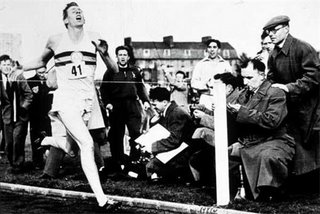Breaking the Four Minute Mile

"I tried to establish this now or never attitude because I knew that unless I was successful in attaining this attitude or mental stance, I would perhaps hurt my chance by letting myself fall prey to the mental reaction so common to athletes -- that is, thinking that there would always be a next time or deciding, perhaps, that this is not the day, when things become difficult and muscles begin to ache from the strain . . . I ran with complete abandon and thought it must be NOW!" -- Roger Bannister, born on this day in 1929 in Harrow, Middlesex, England.
As a student at Exeter and Merton College, Oxford University in 1947, Bannister became involved with the Oxford University Athletic Club and won the mile in the Varsity Match against Cambridge in 4:30.8. Later that year he was invited as an alternate to participate with the British track team in the 1948 Olympics, but he declined, citing his inexperience. To him, it seemed to be a natural response, but at the time his earnest decision received considerable attention in the press.
He continued to coach himself while attending medical school, and landed a spot on the 1952 team to compete in the 1500-meter race. Always well-conditioned, Bannister concentrated much of his training on mental preparedness. At the Helsinki Olympics, Bannister was a 50-50 favorite to win, but Olympic officials changed the schedule at the last minute to add a semi-final round to the two-round sequence, upsetting Bannister's carefully planned regimen. The gold medal went to Josy Barthel, and Bannister came in 4th.
It was a lesson he wouldn't forget. In the two years after the Olympics, other runners such as Gunder Hagg and Arne Andersson were approaching what Bannister called the "Everest" of racing -- breaking the 4-minute mile. He was determined to beat them there. After concentrated mental and physical training, Bannister decided, quite literally, that it was now or never.
On May 6, 1954 at a meet in Oxford's Iffley Road track, Bannister enlisted racemates Chris Brasher and Chris Chataway to pace him through the mile race, scheduled for 6:00 in the evening. At 5:15, it rained briefly, and gusty winds followed. Bannister knew these were horrible conditions for breaking the 4-minute barrier, but that he would never be more mentally-prepared for the moment. The wind died down slightly as the runners lined up at the start, and after a false start, Bannister effortlessly slipped in behind Brasher who had taken the early lead. Despite Bannister's pleas for Brasher to pick up the pace, Brasher kept his head and brought them around the first lap in 57.5 seconds. Just before the 2-1/2 lap mark, Bannister shouted "Chris!," instructing Chris Chataway to take the lead and the brutal pace from Brasher.
With 230 yards left on the final lap, Bannister went into high gear, taking the lead from Chataway and breaking the tape 45 yards ahead of him. He collapsed, almost unconscious.
Track announcer Norris McWhirter (of Guinness Book of Records fame) made the announcement: "Ladies and gentlemen, here is the result of event number nine, the one mile. First, number forty-one, R.G. Bannister of the Amateur Athletic Association and formerly of Exeter and Merton Colleges, with a time which is a new meeting and track record and which, subject to ratification, will be a new English native, British National, British All-Comers', European, British Empire and World's Record. The time is THREE . . ." -- and with that, the crowd drowned out the fact that Bannister had broken the 4-minute mile by 6/10 of a second.
On June 21, 1954, Australian John Landy shattered Bannister's record with a time of 3:57.9, and the world sporting press looked for a match between Landy and Bannister. On August 7, both Bannister and Landy broke the 4-minute mile in a race billed as the "Mile of the Century" at Vancouver, British Columbia, with Bannister edging out Landy, 3:58.8 to 3:59.6. Bannister retired from racing soon afterwards, became a physician, received the knighthood, and led the British "Sport for All" fitness movement.
Labels: Sport





2 Comments:
A little more detail on the race:
http://news.bbc.co.uk/onthisday/
hi/dates/stories/may/6/
newsid_2511000/2511575.stm
I am always suspicious of the great, stand alone hero - what about the backup team?
I met Chris Chataway once when he came to my school to give a speech and give prizes. A charming, self effacing man who made it possible, by sacrificing his own chances, of getting his friend across the line first. I believe he actually ran a sub 4 minute mile himself.
As for Mac Squirt the time keeper - he built a great sense of self importance on the effort of clicking a finger on a stop watch.
During my brief time at Oxford, I knew another character in the Bannister legend -- the late D.J. "Charles" Wenden (Bannister's good friend, and for many years the bursar at All Souls College), who can be seen near the middle of the photo above crouching with the official scoring clipboard, covering his face to hid his tears of joy.
Wenden later wrote an excellent book on silent film, incidentally, called 'The Birth of the Movies,' but was himself a lifelong avid runner and supporter of British track.
Post a Comment
Subscribe to Post Comments [Atom]
<< Home